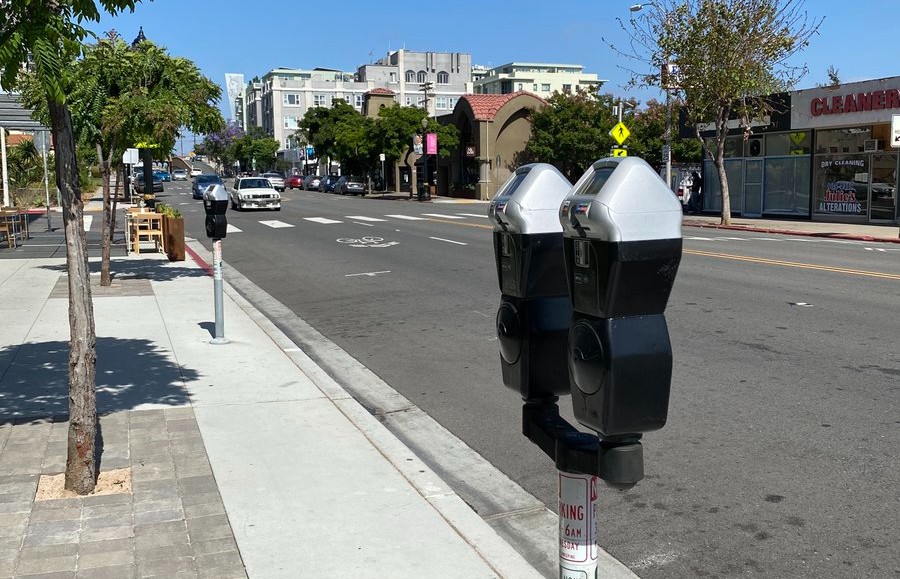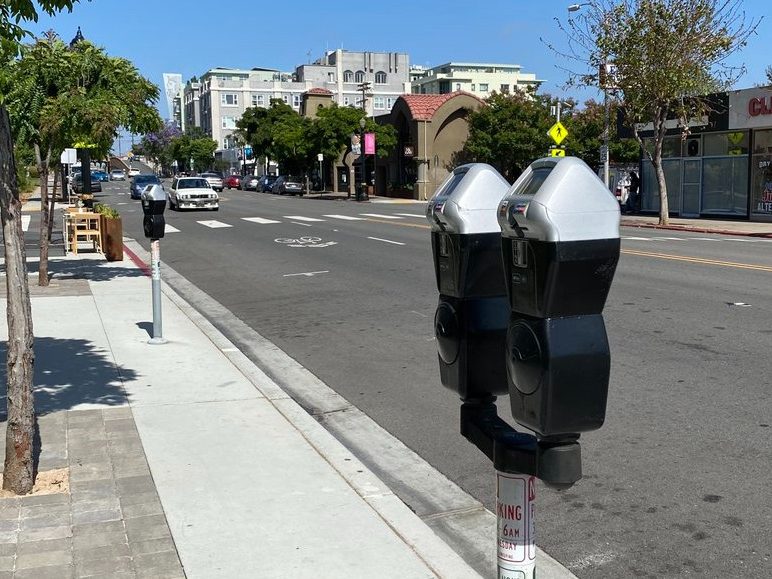 Parking meters on a commercial street in San Diego. (Photo courtesy of the city of San Diego)
Parking meters on a commercial street in San Diego. (Photo courtesy of the city of San Diego)
Through months of tug of war between San Diego City Council and Mayor Todd Gloria’s office over how to plug the multimillion dollar hole in this fiscal year’s city budget, one thing was never in question: San Diegans would foot the bill. How they would do so was less certain.
Well, now, the debate is over.
As the battle over the city’s controversial, proposed budget cuts has raged on over the past few months, the city has been hurrying to implement a flurry of new fees, tax hikes and fine increases to pay for its $6 billion budget.
The new revenue sources, many of which took effect July 1, are expected to bring in over $94 million, with more initiatives on the way in the coming months.
The most controversial proposed budget cuts, including scaled-back hours at public libraries and recreation centers, made it off the chopping block. But they also strained the gaping hole in the city budget, which ballooned from $258 million to $350 million.
The historic budget crisis has pushed the city to seek new and unconventional revenue sources — ranging from cannabis dispensaries to Balboa Park.
Ultimately, the funding will come from San Diegans’ wallets — a contentious move amid a cost-of-living crisis that’s made San Diego one of the most expensive cities in the country to live in.
Here’s how San Diegans are already shelling out for the city’s new budget — and even more ways they can expect to foot the bill in the near future.
Trash pickup
While many San Diegans wish they could throw the city’s contentious new waste pickup fee in the trash, the $80 million that the city expects it to free up from the new budget guarantee it’s here to stay.
The city’s new trash pickup fee for single-family homes and small apartment complexes, including duplexes and townhouses, took effect just in time for its new budget on July 1. The controversial fee broke a 106-year streak of the city providing free trash pickup services for single-family homes out of San Diego’s own budget.
The amount the fee would squeeze from San Diegans’ wallets has been marked up dramatically since voters initially gave the city the ability to charge for trash pickup in 2022. Then, the fee’s exact amount hadn’t yet been decided, but the initiative estimated a pickup fee of $23 to $29.
The final pickup fee that the city passed last month was markedly higher, starting at $32.82 a month. The vast majority of San Diegans subscribe to the waste plan that rakes in the most expensive base pickup fee, at $43.60 a month.
The discrepancy has stoked critics’ complaints — both on the city council and from the public — that the pickup fee originally pitched to voters was fraudulent.
Each pickup fee option is set to climb every year until 2028. The most popular — and most expensive — monthly option is slated to increase by nearly $14 over the next three years, up to $57.55 a month.
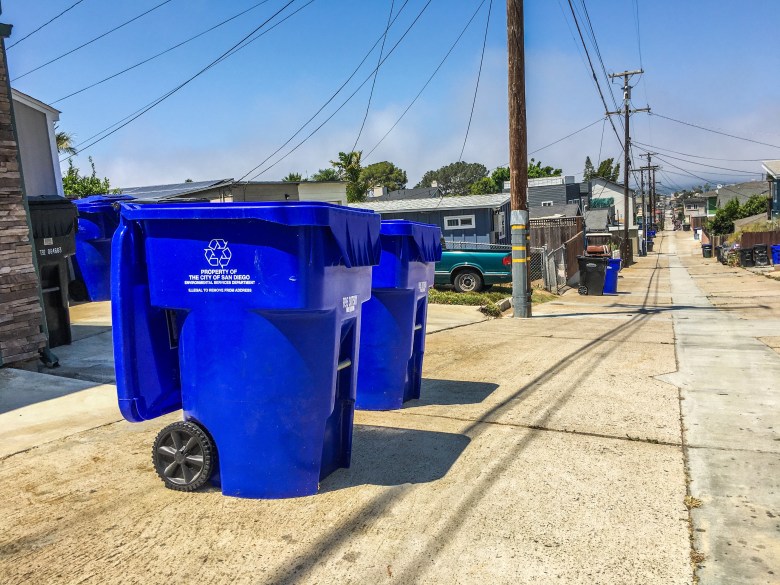 Recycling and trash bins line an alley in Ocean Beach. (File photo by Thomas Melville/Beach & Bay Press)
Recycling and trash bins line an alley in Ocean Beach. (File photo by Thomas Melville/Beach & Bay Press)
The city plans to spend the money generated from the new pickup fee to pay for public safety, neighborhood and infrastructure initiatives.
Parking
A flurry of new and proposed fees, fines and meter hikes has turned parking into a primary target for the city in its quest to cobble together enough money for its new budget.
Paid parking alone is expected to be the city’s second-largest new money maker for its budget, netting the city an expected $29 million.
For the first time in 20 years, San Diego doubled parking rates at city meters, effective Jan. 31. The vast majority of meters now cost $2.50 an hour — then the maximum rate allowed under city law.
But last month, the council shattered that ceiling and handed the city the ability to hike parking rates up dramatically, along with a slew of other new parking powers. That opened the door for San Diego to charge dynamic and surge pricing for meters based on demand, from $1 to $20 an hour.
That means drivers might enjoy discounted parking during low-demand hours or dramatically higher rates when events like sports games, concerts or conventions pack parking.
The decision also cleared the path for the city to charge for parking on Sundays.
The city hasn’t implemented any changes yet, but it does plan to over time. The new budget indicates that may be soon, as it relies on surge meter pricing and Sunday paid parking bringing an expected $9 million.
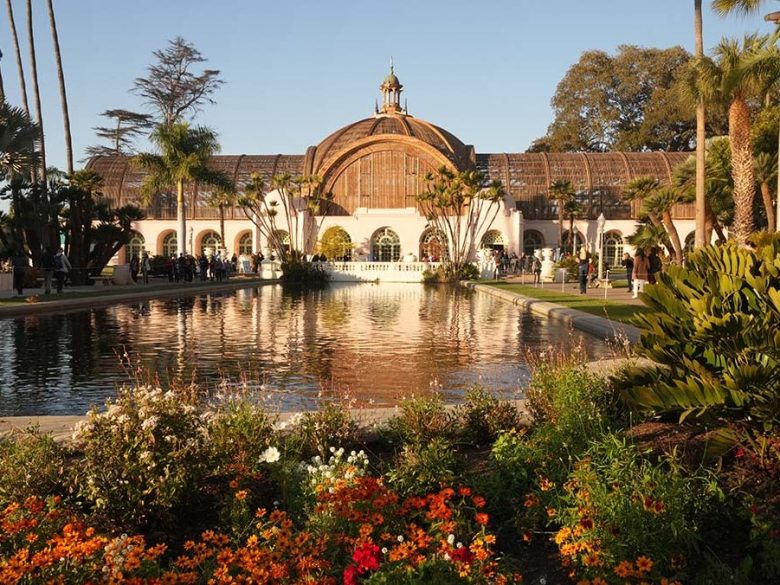 Botanical Building at December Nights in Balboa Park 2024. Photo by Chris Stone
Botanical Building at December Nights in Balboa Park 2024. Photo by Chris Stone
Further down the line is the city’s controversial proposal to charge for parking at Balboa Park and the San Diego Zoo. Two weeks ago, the mayor’s office unveiled a fleshed-out blueprint for paid parking in the park, a move that would net the city budget an expected $11 million.
The mayor’s office is hoping for the city council to approve the plan by July 28 so the city can start charging for parking in October.
On top of the new meter changes, parking tickets will now cost you even more. The city dramatically bumped up parking fines in March — in most cases by about 60% — citing inflation. A ticket for expired vehicle registration, for example, will now cost nearly $25 more, up to $64.50.
The ticketing increases are expected to bring in over $11 million for the city budget. The city plans to use the money it earns off parking on managing and enforcing those rules.
Hotel stays
Booking a San Diego staycation may be a less affordable option under the city’s new, beefed-up hotel room tax.
The tax, which is charged not only to hotel guests but also to motel, short-term rental, campground and RV stays, has long been a major funder of the city’s budget, given San Diego’s status as one of the country’s premier travel destinations. Now, the city expects it to bring in even more money after it hiked up the tax from a flat rate, effective May 1.
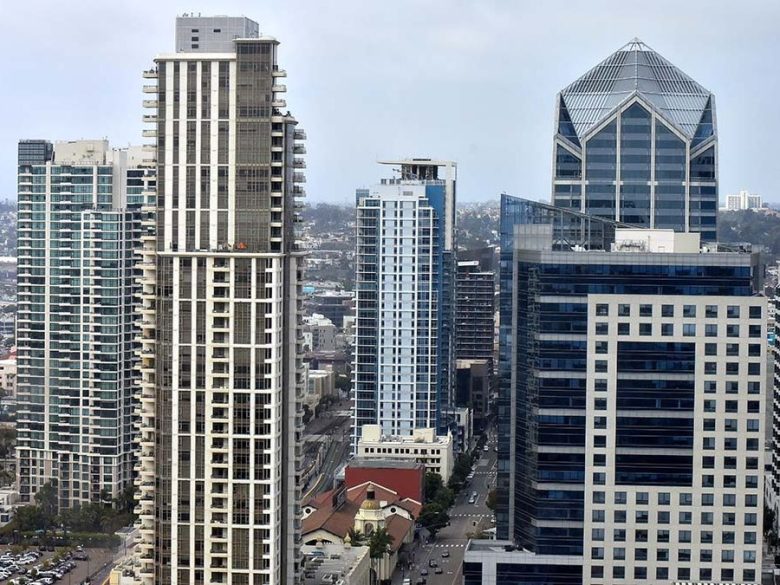 Downtown San Diego. (File photo by Chris Stone/Times of San Diego)
Downtown San Diego. (File photo by Chris Stone/Times of San Diego)
Previously, the city charged a flat tax of about 11 cents for every dollar spent by guests for their stays. Just two months before the new city budget took effect, the city hiked up that flat tax to a range of higher rates, depending on how far guests are staying from downtown.
Guests staying in downtown are charged the most expensive rate, at about 14 cents for every dollar spent on the stay. Guests in the northernmost part of the city and by the Mexico border are subject to the lowest rate, at about 12 cents for every dollar spent on the stay.
The city expects the hotel-room tax hike to bring in the most revenue out of all its new money makers: over $82 million. A chunk of that revenue — nearly $34 million — will be used to expand homelessness services while the rest will go toward remodeling the San Diego Convention Center.
Cannabis dispensaries
Amid the budget crisis, the city found an unlikely ally in cannabis dispensaries, whose sales have for years disappointed city expectations under San Diego’s comparatively stricter dispensary laws.
But cannabis consumers may have to pay the price.
Dispensaries fund the city budget mainly by paying millions of dollars in business taxes. San Diego law, however, had long relegated dispensaries to shorter opening hours than their counterparts in neighboring cities like Oceanside, La Mesa and Chula Vista.
This stunted San Diego dispensaries’ sales and, in turn, the amount of money the city saw from them. Amid its budget deficit, the city council last week finalized its long-awaited decision to allow San Diego dispensaries to open for as long as their counterparts in neighboring cities — from 6 a.m. to 10 p.m.
The move came as San Diego hiked up its dispensary tax for the first time in six years to one of the highest levels in the state, effective May 1. Now, a dime of every dollar dispensaries make goes to the city — a price that dispensary advocates warn may be passed onto customers as businesses respond by upping prices.
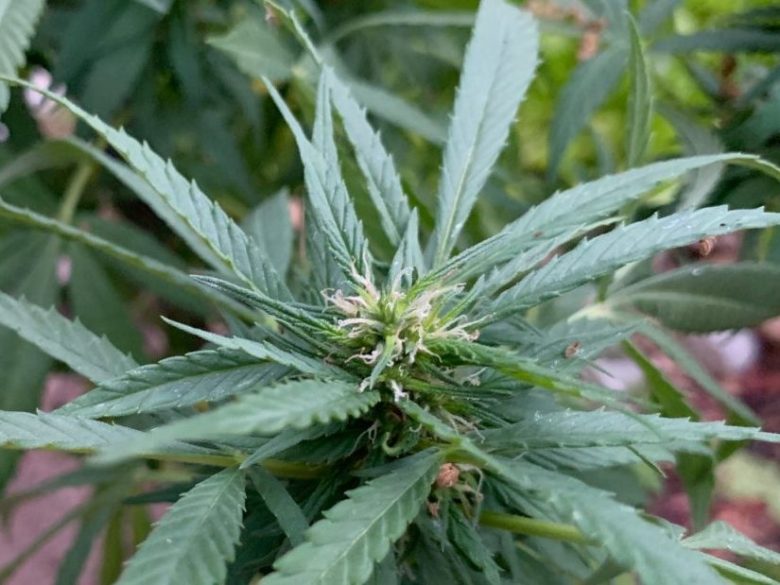 A marijuana plant. (File photo: Times of San Diego)
A marijuana plant. (File photo: Times of San Diego)
“Things are going to be more expensive than they were before,” said Phil Rath, a lobbyist for the San Diego-based United Medical Marijuana Coalition.
The tax hike is expected to bring the city budget nearly $3 million while the longer opening hours are anticipated to net an additional $1.9 million.
Government fees and fines
On top of all the other funding sources the city has targeted in recent months for its budget, the council raised fees across the board for a range of city services in March. From losing a library book to fishing at Lake Barrett, hundreds of city services now cost more.
Under the hikes, prices for large events that demand police and traffic control, like San Diego Pride and San Diego Padres games, are set to rise by tens of thousands of dollars. Most of the targeted fees went up by 20%.
The city also implemented nearly 230 new fees, for services ranging from color printing at the library to fire inspections.
A range of residents and local organizations, including sports leagues, have railed against the fee hikes for pricing them out of city services. The fee changes are set to net the city an expected $19 million, including parking ticket hikes.
